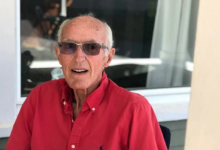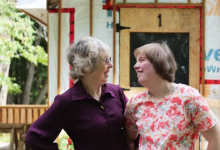How this sailing program is changing the lives of people with disabilities
Jacqueline Czernecki and her friends are no ordinary sailors — each has either a physical or neurological disability and they want to help other people like them get out on the waves and feel the wind at their backs.
Czernecki says their organization, Able Sail Toronto, which currently has 20 members and 20 volunteers to help them, is dedicated to doing just that.
“Sailing was very important for me as a youth. Sailing in the summer kept me from killing myself in the winter because I had a very unfortunate upbringing,” Czernecki told CBC Toronto.
“It still holds that special place for me. I know that many of our members feel that way. Their memories of sailing keep them going into the winter, and once they pass February, March, they know sailing’s coming again, so the winter is much easier to bear.”
In 2000, Czernecki damaged her upper right arm during a fall. She also has PTSD, which she explains involves a lot of anxiety and difficulty in everyday situations.
“With things like sailing — and a couple of Chihuahua service dogs — my life has been transformed,” Czernecki said.
‘The disability just melts away’
Able Sail Toronto uses boats that are adapted specifically for sailors with a variety of disabilities. The keels are designed so the craft won’t tip or sink. Members with wheelchairs are lifted into the boats with harnesses. Special controls, some of them electronic, allow those with limited strength and dexterity to easily steer the sailboat.
Those adaptations make it possible for people with disabilities to experience the freedom of sailing, Czernecki says.
“Once they get out on the water, they leave their wheelchairs behind. Once they’re out on the water, the disability just melts away. They’re the same as every other sailor out there.”
Linda Clarke has the most severe disability among the Able Sail Toronto members.
She was already a very experienced sailor before getting Amyotrophic Lateral Sclerosis (ALS). She was diagnosed eight years ago and lost the ability to speak six years later.
“I had to find a way to sail again,” said Clarke, who now communicates by typing on a device, which then turns the text to audio.
When asked what she loves most about being out on the water sailing, Clarke replied: “The freedom it gives me and I can leave the wheelchair behind.”
Able Sail Toronto says its goal is to provide sailing opportunities to people with disabilities of all ages throughout Ontario.
Approximately 80 per cent of members are in wheelchairs, including paraplegics and quadriplegics. Most of those have higher level disabilities and require adaptations to sail.
Candace Drescher has been sailing since 1968. In late 2005 she suffered a head injury in a car accident, and was injured in another car accident six months later.
She suffers from degeneration of the vertebrae in her neck, fibromyalgia, fatigue and constant pain.
“Sailing was an integral part of my life but after the accident I was thinking there was no way I could handle it,” Drescher told CBC Toronto.
“Crazy,” was how she summed up the feeling of being out on the water.
She says it’s an awesome feeling “just to feel free, to feel that I could do this, to feel that I could do things that I used to do.”








Redes Sociais - Comentários